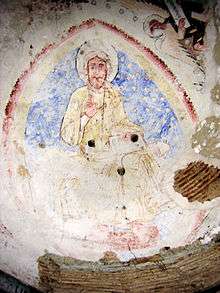fresco
English

Etymology
From Italian fresco, from Medieval Latin friscus, from Proto-Germanic *friskaz. Doublet of fresh.
Pronunciation
- (General American) IPA(key): /ˈfɹɛskoʊ/
- (Received Pronunciation) IPA(key): /ˈfɹɛskəʊ/
- Hyphenation: fre‧sco
Noun
fresco (countable and uncountable, plural frescos or frescoes)
- (countable) A cool, refreshing state of the air; coolness, duskiness, shade.
- a. 1722, Matthew Prior, “Hans Carvel”, in The Poetical Works of Matthew Prior: […], in Two Volumes, volume I, London: Printed for W[illiam] Strahan, […], published 1779, OCLC 491256769, page 124:
- […] I [Satan] cannot ſtay / Flaring in ſun-ſhine all the day: / For, entre nous, we helliſh ſprites, / Love more the freſco of the nights; […]
-
- (countable, painting) An artwork made by applying water-based pigment to wet or fresh lime mortar or plaster.
- (uncountable, painting) The technique used to make such an artwork.
Translations
|
|
Verb
fresco (third-person singular simple present frescoes, present participle frescoing, simple past and past participle frescoed)
- (transitive, intransitive) To paint using fresco.
Translations
|
|
Dutch
Etymology
From Italian fresco, from Medieval Latin friscus, from Proto-Germanic *friskaz, whence also Dutch vers and fris.
Pronunciation
Audio (file) - Hyphenation: fres‧co
Galician
Etymology
13th century. From a Western Germanic language, either directly or through Vulgar Latin friscus, from Proto-Germanic *friskaz, whence also English fresh.[1]
Fresco, as a painting technique, was taken from Italian fresco.
Pronunciation
- IPA(key): /ˈfɾesko̝/
Related terms
- ao fresco
Adjective
fresco m (feminine singular fresca, masculine plural frescos, feminine plural frescas)
- fresh, recent, young, rested
- 1295, Ramón Lorenzo (ed.), La traducción gallega de la Crónica General y de la Crónica de Castilla. Ourense: I.E.O.P.F., p. 657:
- Et cada dia, depoys que esto fezo, parouse sua cara et seu corpo mays fresco
- And everyday, after doing this, his face and his body were younger
- Et cada dia, depoys que esto fezo, parouse sua cara et seu corpo mays fresco
- 1434, M. Lucas Alvarez & M. J. Justo Martín (eds.), Fontes documentais da Universidade de Santiago de Compostela. Pergameos da serie Bens do Arquivo Histórico Universitario (Anos 1237-1537). Santiago: Consello da Cultura Galega, page 350:
- E non enperqua o "septe rogo", que se borrou estando fresquo, que paresçe que foy raydo
- and [whoever reads this text] don't mistrust the "septe rogo", because it faded when fresh, although it looks as it was deleted
- E non enperqua o "septe rogo", que se borrou estando fresquo, que paresçe que foy raydo
- 1295, Ramón Lorenzo (ed.), La traducción gallega de la Crónica General y de la Crónica de Castilla. Ourense: I.E.O.P.F., p. 657:
- untransformed, not artificiality preserved (meat, fish)
- 1291, Enrique Cal Pardo (ed.), Colección diplomática medieval do arquivo da catedral de Mondoñedo. Santiago: Consello da Cultura Galega, p. 79:
- La quartillos de salgada et xx quartillos de fresca [...] et disso que da fresca marmara iiii quartillos ao salgar
- 50 quarters of salted [fish] and 20 quarters of fresh [fish] [...] and he said that the fresh one diminished 4 quarter after salting
- La quartillos de salgada et xx quartillos de fresca [...] et disso que da fresca marmara iiii quartillos ao salgar
- 1291, Enrique Cal Pardo (ed.), Colección diplomática medieval do arquivo da catedral de Mondoñedo. Santiago: Consello da Cultura Galega, p. 79:
- cool (temperature)
- impertinent
Further reading
- “fresco” in Dicionario da Real Academia Galega, Royal Galician Academy.
References
- “fresco” in Dicionario de Dicionarios do galego medieval, SLI - ILGA 2006-2012.
- “fresc” in Xavier Varela Barreiro & Xavier Gómez Guinovart: Corpus Xelmírez - Corpus lingüístico da Galicia medieval. SLI / Grupo TALG / ILG, 2006-2016.
- “fresco” in Dicionario de Dicionarios da lingua galega, SLI - ILGA 2006-2013.
- “fresco” in Tesouro informatizado da lingua galega. Santiago: ILG.
- “fresco” in Álvarez, Rosario (coord.): Tesouro do léxico patrimonial galego e portugués, Santiago de Compostela: Instituto da Lingua Galega.
- Coromines, Joan; Pascual, José A. (1991–1997). Diccionario crítico etimológico castellano e hispánico. Madrid: Gredos, s.v. fresco.
Italian
Etymology
From Medieval Latin friscus, frescus, from Lombardic frisc, from Proto-Germanic *friskaz, from Proto-Indo-European *preysk-.
Pronunciation
- IPA(key): /ˈfreː.sko/
Noun
fresco m (plural freschi)
Antonyms
Related terms
Descendants
- → Asturian: frescu
- → Bulgarian: фреско (fresko)
- → Dutch: fresco
- → English: fresco
- → Galician: fresco
- → Hungarian: freskó
- → Malay: fresko
- → Danish: fresko
- → Esperanto: fresko
- → German: Fresko
- → Japanese: フレスコ (furesuko)
- → Korean: 프레스코 (peureseuko)
- → Norwegian Bokmål: fresko
- → Norwegian Nynorsk: fresko
- → Spanish: fresco
Portuguese
Etymology
From Old Portuguese fresco, from Medieval Latin frescus, friscus, from Germanic *frisk, Proto-Germanic *friskaz, from Proto-Indo-European *preysk-.
Pronunciation
Spanish
Etymology
From Medieval Latin friscus, frescus, from Germanic *frisk, Proto-Germanic *friskaz, from Proto-Indo-European *preysk-.
Related terms
Further reading
- “fresco” in Diccionario de la lengua española, Vigésima tercera edición, Real Academia Española, 2014.